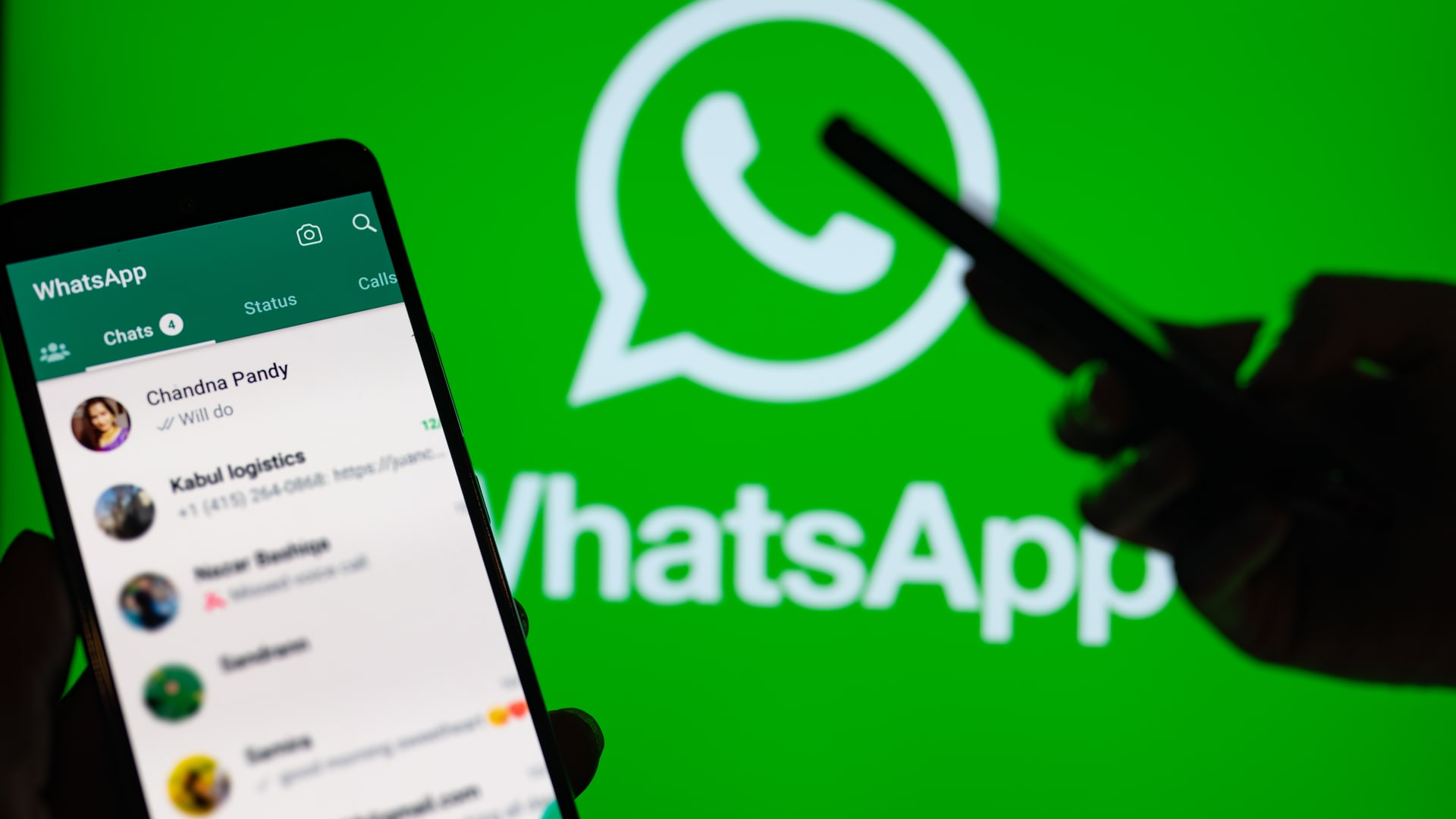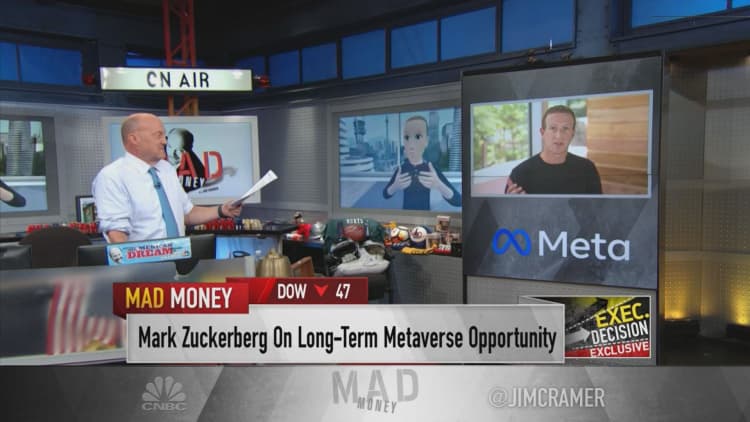

It’s been almost a decade since Facebook founder Mark Zuckerberg shocked the tech world, announcing his company’s agreement to spend $19 billion on WhatsApp, a popular messaging app with a tiny business.
Since then, WhatsApp has remained somewhat of an anachronism. Usage has continued to grow, with more than 2 billion people now counting on the app to chat with friends and family, up from 450 million at the time of the acquisition. But it’s still not much of a moneymaker.
Unlike Instagram, which Facebook bought in 2012 for the much tidier sum of roughly $1 billion, WhatsApp doesn’t show ads, which is Zuckerberg’s core business. It’s also unrelated to his company’s hugely expensive pivot to the metaverse or its effort to catch up to TikTok with its short video product, Reels.
But the company now known as Meta has no intention of sidelining WhatsApp. Rather, Zuckerberg regularly touts the value of the asset and its potential to expand, boasting on Meta’s latest earnings call about the 200 million people who use the WhatsApp Business app, which helps companies communicate with clients. He told CNBC’s Jim Cramer in June 2022 that WhatsApp represents the “next chapter” for Meta.
To parlay its massive user base into a product that contributes in a big way to the bottom line, WhatsApp needs more large businesses across the globe to rely on the service as a main way to converse with customers. For each conversation, companies pay in the range of a half-cent to 15 cents, depending on the kind of chat and the country in which the exchange takes place.
“It’s been clear for many years that people are trying to connect with businesses on WhatsApp,” said Alice Newton-Rex, the unit’s product director, in an interview with CNBC. “If you go to India or Brazil and you look around, you’ll see WhatsApp numbers posted up in shop windows everywhere. This is how businesses want to engage with their customers.”
Consumers in India, for example, use WhatsApp to book Uber rides and get movie recommendations on their Netflix accounts.
Newton-Rex joined WhatsApp four years ago, leaving her high-level position at London-based financial firm WorldRemit for the new gig. At the time, WhatsApp only had 15 product managers, a number that’s since ballooned to 90.
The product group is now tasked with building features that can unlock WhatsApp’s business in a substantial way and in helping WhatsApp fulfill the potential that Zuckerberg has long seen in the app.
Newton-Rex said Zuckerberg has been “a big part of the team,” adding that he regularly speaks with Will Cathcart, the current head of WhatsApp.
“He’s a big part of our strategy,” she said about Zuckerberg’s support of WhatsApp and its road map.
WhatsApp’s popularity around the world is undeniable. In countries like Brazil, India and Indonesia, people use it to chat with family and friends and stay updated on current affairs. There’s particular appeal in countries that historically lacked robust telecommunications infrastructure, as WhatsApp has made it feasible for people in those regions to affordably communicate via smartphone.
“Back in 2009, it was extremely expensive to send a text message, and if you wanted to make a call or particularly an international call, that might set you back hundreds of dollars,” Newton-Rex said. “WhatsApp changed all that.”
Newton-Rex recalled the time a member of the app’s research group compared WhatsApp to oxygen.
“I think the idea that it’s sort of everywhere and it’s effortless to use, you maybe don’t think too deeply about using it, but you would be in real trouble if someone took it away,” she said.
What’s up with WhatsApp’s business?
But for analysts and investors, WhatsApp’s true value to Meta has long been unclear. The company doesn’t reveal the size of the business. Nick Lane, founder of research firm Mobilesquared, estimates its revenue to be between about $500 million and $1 billion, equaling less than 1% of Meta’s total sales.
Instagram, by contrast, will bring in a projected $40 billion in revenue this year, according to Debra Aho Williamson, an analyst at Insider Intelligence.
“Facebook bought WhatsApp nearly nine years ago — It’s a long time to have an app that has enormous usage, but where’s the revenue?” Williamson said with a chuckle. “We’ve kind of been watching it for years and years going, ‘OK, guys.'”
The business challenge for WhatsApp dates back to its origins. Co-founders Jan Koum and Brian Acton publicly lambasted the advertising industry in a 2012 blog post, writing that “no one wakes up excited to see more advertising, no one goes to sleep thinking about the ads they’ll see tomorrow.”
Former WhatsApp CEO and co-founder Jan Koum
David Ramos | Getty Images
In the years after the Facebook deal, Koum and Acton reportedly clashed with executives over issues related to data privacy and monetizing WhatsApp. Acton left in 2017, and Koum followed him out the door a year later.
It’s not just an issue of privacy and morals. As Williamson noted, WhatsApp’s core function as an encrypted platform for people to send each other private messages isn’t particularly “conducive to advertising.” Does a user really want a McDonald’s promotion to pop up alongside private messages with family members?
Yet throughout its almost two decades, Facebook has never had much of a business outside of ads, even as it’s expanded into consumer gadgets and the metaverse and, in the case of WhatsApp, getting companies to pay for messaging.
The plan is five years in the making. Meta kick-started its WhatsApp Business app in 2018, pitching it as a way for companies to more easily communicate with users through verified commercial accounts and a suite of in-app tools. In June, Meta said the WhatsApp Business app had quadrupled in the past three years to 200 million monthly active users.
Small companies can use the app for free or, depending on the country, pay a monthly subscription for added features like the ability to build a WhatsApp website, and to access a corporate account on up to 10 devices. Larger companies can pay for more expansive messaging campaigns and features to help them provide more customer service and support to big audiences via the WhatsApp Business platform.
With the upper-tier service, Meta charges per conversation, and the fee varies. In Brazil, for instance, a brief authentication conversation in which users are prompted to enter one-time passcodes for verification could cost a company 3.15 cents, while more complicated and extended marketing conversations detailing new promotions or special deals may cost 6.25 cents.
Meta said in its most recent annual report that sales in the company’s “Family of Apps-other revenue” segment, which houses the WhatsApp Business platform and other revenue sources like the net fees Meta receives from developers using its payment infrastructure, grew 12% year over year to $808 million in 2022.
While companies can’t run online ads on WhatsApp, they can buy a special kind of ad that’s now core to WhatsApp’s business strategy called “click-to-message,” which essentially redirects Instagram and Facebook users to WhatsApp to initiate an immediate conversation, Newton-Rex said.
Mark Zuckerberg told the world in October 2021 that he was rebranding Facebook to Meta as the company pushes toward the metaverse.
Facebook | via Reuters
It’s a strategy Meta is deploying more broadly. Zuckerberg said last year that the company’s click-to-message ad products running across WhatsApp, Messenger and Instagram are generating about $9 billion in annualized revenue. Most of those sales stem from the company’s Messenger app, which was first to offer that type of ad, but Zuckerberg said that the WhatsApp-specific click-to-message ads “just passed a $1.5 billion run rate, growing more than 80% year over year.” Meta says that all rolls up to total ad revenue and is not housed within WhatsApp.
More recently, Zuckerberg said during Meta’s first-quarter 2023 earnings call that the company’s click-to-message ads reached $10 billion in annualized revenue and added that “paid messaging on WhatsApp — has grown by 40% quarter over quarter,” without giving a revenue figure.
In addition to the newer ad products, Newton-Rex also highlighted WhatsApp’s Channels feature, which Meta debuted in June. The new tool, which is akin to a similar feature available in the Telegram messaging app, is intended to function like a “private broadcast service,” separate from the core WhatsApp messaging that takes place between friends and family members. It lets organizations and power users create their own channels to send messages or post updates and polls to large groups of people.
Although Channels is currently only available in a few countries, including Colombia and Singapore, Newton-Rex said Meta has bigger plans in store for the product and is considering ways to make money from it.
“Maybe you’ll be able to subscribe to a channel and you’d pay a small fee to hear from a news outlet or some celebrity who you cared about,” Newton-Rex said. “That could include also allowing channel owners to promote their own channel in our directory.”
As a broadcast tool, Channels isn’t an encrypted service. In the future, WhatsApp may allow groups like nonprofits or health organizations to ensure communications are encrypted for user or patient protection, the company said.
In looking for other ways to make money from Channels, ads could be an option, as there’s now a way for companies to run promotions without forcing them into a stream of confidential messages.
“We’re looking at a whole range of different monetization opportunities,” Newton-Rex said. “We haven’t fixed on any one thing yet.”
Cracking the U.S.
For all of Meta’s focus on WhatsApp expansion, the U.S. remains an elusive market, even though it’s a huge part of the parent company’s business. In the latest quarter, the U.S. and Canada combined accounted for 45% of Meta’s revenue.
According to Insider Intelligence data released in May, WhatsApp user penetration around the world was the highest in Spain, Italy and Argentina. In each country, at least 80% of internet users accessed WhatsApp once a month or more. In the U.S., that number was just 21.8%.
Still, Newton-Rex called North America WhatsApp’s “fastest-growing region,” without elaborating.
Researchers have found that the people in the U.S. most likely to use WhatsApp come from immigrant communities with extended family in other countries. The Pew Research Center has previously detailed that WhatsApp is the most popular messaging app used by Hispanic Americans.
For “a lot of people around the world who don’t use so many different internet services, WhatsApp is their gateway into having interactions on the internet,” Newton-Rex said.
Because WhatsApp uses encryption technology, it’s also attractive for people in countries with more repressive government regimes, while consumers in the U.S. are generally comfortable using Apple’s iMessage as well as direct messages on Facebook and X, formerly known as Twitter.
Newton-Rex said part of WhatsApp’s marketing strategy in the U.S. focuses on the app’s encryption technology, because data privacy often “comes up as an absolute top concern” for users. Last year, the company debuted a major promotional campaign highlighting WhatsApp’s encryption features.
Meta has been hammered in recent years by a number of data privacy blunders, such as the Cambridge Analytica scandal, scarring the company’s reputation.
“People really do know how important end-to-end encryption is,” Newton-Rex said. “They know that they don’t want their messages to be vulnerable to hackers, criminals, oppressive governments or anyone else who’s trying to listen in.”
Meanwhile, as Meta and other tech giants pour billions of dollars into generative artificial intelligence, Zuckerberg recently said his company plans to include more advanced chatbots into WhatsApp and other messaging tools.
Newton-Rex said Meta’s push into generative AI could assist in the development of more kinds of “business applications.”
“I think that messaging is going to be the main way that people interact with generative AI in future,” she said. “Imagine being able to have a really easy, instant, real-time conversation whenever you wanted to get customer service or to buy something with a business who you wanted to transact with. But it’s not just business applications.”
The global business messaging space is currently worth about $32 billion and is dominated by SMS, or short message service, technology that’s used to send things like status updates on airplane flight changes, Mobilesquared’s Lane said.
Lane said WhatsApp has the opportunity to offer more compelling ways for businesses to communicate with customers beyond short, simple text messages.
“For example, if you’re a restaurant, you can put your whole menu, different pages of your menu on WhatsApp,” Lane said. “The experience that you can have on a website or on an app, you can now have that within the messaging experience.”
That looks like a far-off promise, at least in the North American market. Williamson from Insider Intelligence said she does “not see any leap in usage of WhatsApp in the U.S.” in the near future.
WATCH: How Amazon is racing to catch up in generative AI with custom AWS chips





